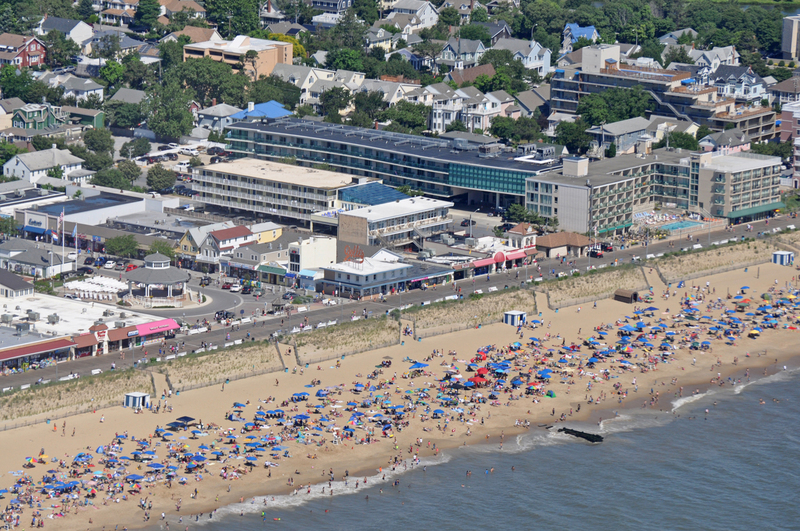Rehoboth Beach voters will likely go to the polls in April or May to vote on a referendum to pay for the proposed ocean outfall and an upgraded City Hall.
All told, the city expects to borrow a total of $58 million for the two projects: $40 million for the outfall and $18 million for City Hall. Final cost estimates have not been nailed down, but Mayor Sam Cooper said the figures should soon be in. Once the city commits to the referendum, he said, the borrowing amount is set; it can be raised no higher.
He said he wanted to go to referendum sooner, rather than later, because the city is under a court order to complete the outfall by 2018. Should the outfall project be turned down by the voters, Cooper said, the city would need time to come up with a new plan.
To clear the way, Cooper recommended a charter change increasing the city’s borrowing limit from $50 million to $75 million. A charter change requires a vote of the General Assembly.
To get to a referendum, the city commissioners must first set a public hearing, where city officials would present the plans and answer questions. After the hearing, the city would schedule a vote. All property owners and residents are eligible to vote; corporate entities can vote by proxy.
Cooper said if voters approve the referendum, the city would raise the money through the sale of public bonds to be accomplished with help from a financial consultant.
City Hall project takes shape
The City Hall Complex Master Plan Task Force has agreed on most of the design components for a two-story structure with an attic space. On Feb. 9, the task force continued to finalize interior details of the commissioners’ room and the design of the atrium that will serve as the main entryway to the building and access way to second floor offices.
Architects Mike Wigley, Rick DiSabatino and Rob Belfiore presented an updated schedule and cost estimate. Design work is expected to continue until Monday, March 9. Once the commissioners give final approval to the design, EDiS will begin preparing construction documents. On Tuesday, Sept. 8, EDiS will prepare the construction bid, with an eye toward selecting a contractor on Friday, Nov. 13.
At that point, the convention center will be closed and the site will be prepared for construction. The City Hall building is scheduled for demolition starting Monday, Dec. 14; the police department and city administration will be moved to temporary quarters. EDiS plans for the new City Hall to be ready for occupation in January 2017; the convention center would reopen Feb. 13, 2017.
EDiS has estimated the cost of the City Hall project at $17 million, but with the possible $2 million sale of the city-owned property at 306 Rehoboth Ave. – currently occupied by building and licensing – the cost would go down to $15 million.
Next steps for outfall
With the Jan. 5 decision by Department of Natural Resources and Environmental Control Secretary David Small approving the city’s environmental impact statement for an ocean outfall, Rehoboth is now moving forward with preliminary work by executing a series of task orders recommended by engineer GHD.
The first is to finalize the force main route from the treatment plant to the outfall pipe, 6,000 feet off Deauville Beach. The original proposal was to drill the pipe underneath Grove Park and then open-trench cut from Henlopen Avenue to the Deauville Beach parking lot.
Cooper said the cost of directional drilling has increased, so GHD is reviewing a plan to open cut the entire route and bypass Grove Park. A new route has not been identified; the estimated cost of this task is $446,000.
The second task, estimated at $227,000, is to convert a post-aeration basin – a holding tank at the wastewater treatment tank where treated wastewater can mix with oxygen from the air – and turn it into the pump station that will pump treated effluent to the ocean.
The final task calls for rehabilitation and changes at the wastewater treatment plant, which will cost $1.18 million. All of the task orders are unrelated to the state-funded portion of the project and are instead included in the city’s budget, so work can begin before the referendum is voted on. The commissioners will vote on the task orders at their Friday, Feb. 20 meeting.
Small’s decision allows the city to move forward to seek state funding for the estimated $35 million project. Of that total, $25 million would be devoted to outfall itself and $10 million would go towards upgrades to the wastewater treatment plant.
Sussex County will also be contributing 40 percent of the cost of the project for Dewey Beach, Henlopen Acres and North Shores, towns whose wastewater is treated by Rehoboth’s plant. Cooper said the interest rate on the loan will be about 3 percent.
In approving the environmental impact statement, Small required the city study ways to clean up stormwater that goes into the ocean. The commissioners plan to allocate $138,000 for GHD to perform a study of the city’s five stormwater outfalls. The study is to be completed by Jan. 1.
Cooper said the study will look at the area that contributes to the outfalls, what pollutants may be going out and how to filter those pollutants out of the strormwater before they get to the ocean. Cooper said stormwater improvements should be funded by the city exclusively, but he wants DNREC fully involved in the project.
“I think, as it relates to bathing water, these stormwater outfalls are huge. They are 1,000 times more impactful than the wastewater outfall will ever be,” he said.


















































